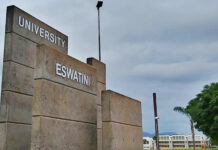
Due to Eswatini Revenue Service’s (ERS) efficiencies, domestic revenue collection improved, reaching E7.7 billion.
According to the mid-term budget review report 2025/26 presented by Minister for Finance Neal Rijkenberg in the House of Assembly yesterday, domestic revenue collection at half year amounted to E7.7 billion.
| Eswatini Observer WhatsApp Channel
He said this was above the E7 billion collected at the same time last year, which showed an improvement on domestic taxes collection.
“This represents 43% of the projected annual domestic revenue target of E17.72 billion, indicating a moderate performance relative to the budget forecast,” the minister said.
He added that in line with positive economic growth prospects in the medium term, government revenue was expected to grow steadily, driven by stronger domestic collection as a result of enhanced tax administration efficiency gains, digitalisation of revenue systems and strengthened tax compliance efforts.
Rijkenberg said additionally, stable SACU receipts and continued contributions to the SACU Stabilisation Fund would help smooth revenue volatility and support fiscal stability.
ALSO READ: Tolls revenue to enhance roads, infrastructure
He said grants received at half year amounted to E85 million while in 2024/25 they were E141 million. The minister explained that the decline was mainly due to delays in disbursements from some development partners, reflecting project implementation bottlenecks and slower execution of government capital projects.
Adding, Rijkenberg said the SACU receipts continued to be a major contributor to total revenue, amounting to E5.20 billion at mid-year compared to E6.53 billion in the 2024/25 financial year.
He cautioned that SACU revenue remain volatile and externally determined, posing a risk to fiscal stability.
The minister said for the 2025/26 financial year, total SACU receipts were projected at E10.40 billion, slightly lower than in the previous fiscal year, reflecting a moderation in regional trade and customs pool performance.
“To mitigate volatility, government remains committed to building fiscal buffers through allocations to the SACU Stabilisation Fund, aimed at smoothing the impact of revenue fluctuations in future years,” he said.
He said income tax remained government’s largest contributor to domestic revenue collection. Company tax, PAYE and other income tax collections stood at E4.3 billion at half year. This equated to 47% of the annual revenue collection and was higher than the E3.8 billion collected at half year in 2024/25 financial year.
He explained that company taxes collected during the first half of the financial year amounted to E1.2 billion, that is 53% of the annual company taxes projection of E2.3 billion.
Individual taxes, that is Pay as You Earn (PAYE), collected at half year amounted to E2.5 billion. This equals a 43% collection of the projected annual PAYE of E5.8 billion and an increase of E200 million collected at the same time last financial year.
The minister added that taxes on goods and services constituted government’s second largest contributor to domestic revenue collection. VAT collection is the largest source within these taxes.
ALSO READ: ERS in bid to close E4.4 billion tax gap
He said at half year, this totalled E2.8 billion, which translated to 48% of the projected annual VAT collection of E5.9 billion. He said the collection of VAT showed an increase of E400 million compared to the 2024/25 financial year collection in the same period, which was E2.4 billion.
The minister said at mid-year, total revenue and grants stood at E13.20 billion, an increase from E13.17 billion recorded during the same period in financial year 2024/25.
He said the improvement was mainly attributed to stronger SACU receipts and steady performance in domestic tax revenue.
“This increase represents 43% of the projected annual domestic revenue target of E17.72 billion, indicating a moderate performance relative to the budget forecast. In addition, the growth in domestic revenues was driven largely by income taxes and value added tax (VAT) collections, reflecting both improved tax compliance and a recovery in economic activity, particularly in the services and manufacturing sectors.”
He said as at mid-year 2025/26, the budget deficit was at E2.12 billion, an increase from the E1.83 billion recorded in the same period of financial year 2024/25.
The minister said the budget deficit was fully financed, primarily through the mobilisation of budget support loans totalling around E3.6 billion.
“The disbursement of these concessional loans has played a vital role in clearing outstanding domestic arrears, enhancing liquidity in the local economy and rebuilding confidence among suppliers and contractors.”
Eswatini Observer Press Reader | View Here









